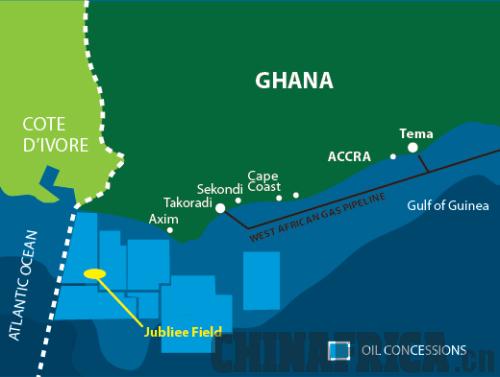|

Ghana's discovery of oil on its border with Cote d'Ivoire is testing the long-standing relationship between the two nations. The long running dispute over oil has led to Cote d'Ivoire's Director General of Hydrocarbons and Petroci unveiling a new maritime border with Ghana in November 2011, that includes some of the massive oil wealth in the western region, Ghana's Jubilee oil fields, as reported by Upstream, a global oil and gas publication.
Public challenge
This new border constitutes a public challenge to Ghana's offshore acreage, which according to Ghana's Tullow Oil holds close to a billion barrels in untapped oil reserves. Tullow Oil reported that they had been asked in April 2010 to sign an agreement with Cote d'Ivoire's Director General of Hydrocarbons and Petroci failing which they would be prevented from operating, which was confirmed by Ghana's Minister for Information Okudzeto Abrokwa. Apart from Tullow Oil, the new border also includes laying claim to much of Tullow Oil's Jubilee, Tweneboa, Enyenra and Owo discoveries, among others, plus the West Tano-1X find and several prospect sites.
In March 2010, Ghana President John Evans Atta Mills passed the Ghana Boundary Commission Bill to establish a commission to negotiate proper demarcation of Ghana's land and maritime boundaries with neighboring countries. This was after Cote d'Ivoire first raised concerns that Ghana has encroached on its territorial waters.
Ghana's Energy Minister Joe Oteng Adjei said there is a critical need to put in place a commission that would lead to the negotiation of Ghana's maritime and land boundaries with the country's neighbors. "There are international laws and United Nation's conventions that need to be respected." Adjei said areas couldn't just be taken over with claims, as negotiations are needed. "As we put our commission in place then we have the mandate to meet with our counterpart as to the delimitations of our maritime boundary," he said.
Boundary commission
The 14-member Ghana Boundary Commission, chaired by the Minister of Lands and Forestry, Collins Dauda, is the result of legislation pushed through by the government earlier following the discovery of commercial quantities of oil in the deep-water Dzata-1 exploration well off Cape Three Points in the western region, which Cote d'Ivoire says lies within its border.
Upstream said that the border dispute is interesting because a recognized maritime border does not divide Cote d'Ivoire and Ghana. Instead, they have used a median line derived from the position of the end-point of their land boundary. This was defined in an Anglo-French agreement of 1893, based upon the position of a house occupied by British officials in the 1880s. After independence the two countries agreed to set up a joint commission to redefine their common border, but no action was ever taken.
Upstream reported that discovery of oil by Ghana was enough to demonstrate the inadequacy of a simple median line. Cote d'Ivoire has since argued that a precise maritime boundary must be delimited, and the boundary that is eventually constructed will pertain to the area that is the object of Cote d'Ivoire's current protest.
|